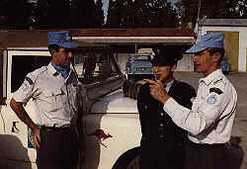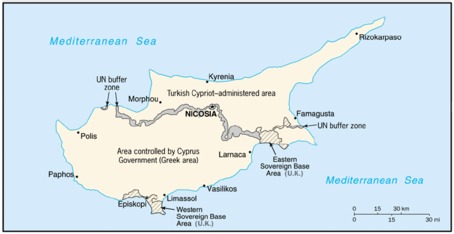

|
Home
| Databases
| WorldLII
| Search
| Feedback
Australian Federal Police - Platypus Journal/Magazine |
Cyprus 33 years later: a reflection on tours of duty more than three decades apart
By Federal Agent Graham Taylor
Federal Agent Graham Taylor is in the unique position of having returned to Cyprus as Commander of the Australian/Irish civilian police just over three decades after he first saw service there as a constable. In the article that follows he reflects on what has and has not changed on the troubled island.

Graham Taylor (left) first went to Cyprus as a constable in 1966. He is seen here with an unknown Cyprus policeman and Neville Patterson of the South Australia Police.
As a young constable in 1966, I became the third member of the Australian Capital Territory Police to be seconded to the multi-State Australian Police Contingent to serve with the United Nations Force in Cyprus (UNFICYP).
In 1999, after 33 years, I had the opportunity to return to Cyprus, this time as Commander of the combined Australian/Irish civilian police (UNCIVPOL) attached to UNFICYP. It was an opportunity which I relished, not only because I would be able to compare service at opposite ends of the hierarchy, but because I would be able to see whether Cyprus and UNFICYP had changed.
The first secondee to UNFICYP from the ACT Police was Mick Richards and the second was John Saunders. Errol Canney (Commonwealth Police) was the Police Adviser to the Chief of Mission and Jack O'Connor (Victoria Police) the Commander of the contingent. At that time, the total Australian contribution to UNFICYP was 40 members, comprised of representatives from Commonwealth, State and Territory police services. In the mid-70s that number was reduced to 20, but, since inception, many hundreds of Australian Federal Police and State police have performed duty in Cyprus.

Cyprus is a Mediterranean island close to the coast of Turkey. It is a tourist destination for many Europeans because of its warm, sunny climate, friendly population and rich heritage of food, wine, artefacts and culture. Over the centuries, however, it has been besieged by racial, cultural and religious differences and recent history saw much conflict between the Greek and Turkish populations following the granting of independence from the British. In 1963, the United Nations intervened and sent military and police to maintain the peace until a political settlement could be reached. Although settlement has never been close, there is a glimmer of hope at present that progress may be made with the commencement of peace talks between President of the Republic of Cyprus Glafcos Clerides and President of the Turkish Republic of Northern Cyprus Rauf Denktash. Also, the thawing of relations between the Greek and Turkish Governments following the assistance rendered to Turkey by Greece after the major earthquakes in mid-1999 augers well for future progress.
During my first tour of duty in 1966, it was common to see donkeys carrying huge loads of produce and paddocks being ploughed by cattle-drawn wooden cultivators. I also have memories of grape juice trails left along the roads by trucks hauling grapes; of beautiful fruit and vegetables, particularly the tasty strawberries in the spring and oranges in the winter. I also remember many racially-mixed villages but now there is only one mixed village - Pyla. One to one, the inhabitants get along well, but politically there still are many problems in Pyla. A full-time Civilian Affairs officer has been posted there to deal with planning issues and disputes of a non-police nature. The six Australian and Irish police stationed at Pyla are kept busy because they perform community policing for the village. AFP officer Larry Andrews was the senior policeman living in Pyla during 1999 and can recount many interesting stories about the major and minor conflicts that have taken place in the area.
The capital, Nicosia, was smaller in the 60s and not divided, as it is now, by the Buffer Zone (BZ). In fact, it is now the only divided city in the world. The integrity of the BZ is maintained by the military and UNCIVPOL and duties in the area are shared between the military, UNCIVPOL and Civil Affairs officers. AFP Superintendent George Burton often rode his bicycle around the BZ and has a store of stories about places along the green line that carry such names as Morris Minor Corner.
Greek Nicosia bustles with activity; young men and women dress fashionably; and Mercedes, Porches and other late model cars are not uncommon. The economy of the south is strong and from all indications will remain so. One Cyprus Pound equates to $A2.50, whereas in the 60s it was one for one. In contrast, the Turkish Cypriot side is not as commercial or modern and the old part of the town, with its narrow laneways, “jeans alley” and the markets, remains of great interest to tourists and newcomers. Its currency is aligned to the Turkish lire, which is suffering from hyperinflation. The cost of goods in supermarkets rise on a daily basis. The price of petrol rose from 165,000 lire/litre to 350,000 lire/litre last year.
One thing the two sides of the country have in common, and which was as I remembered it, is driver behaviour. Cypriot drivers seem to take a highly individualised interpretation of the local road rules which keeps pedestrians and bicycle riders on their guard.
Although the new highways throughout the island are excellent and there is often a police presence, speeding vehicles are a constant danger. There are approximately 100 fatalities in Cyprus each year.
Another constant is the weather. Winters are cool and pleasant, but the summer months, particularly July and August, are extremely hot, On several occasions during my stay, the thermometer climbed close to 50 degrees. Water is a major problem for the Cypriots, especially for farmers and the tourist industry. In the north, in an effort to overcome shortages, the Turkish Cypriots plan to lay a pipeline from Turkey. There was talk that they would be prepared to share water with the Greek Cypriots on a cost-sharing basis.
During my first tour, Australian police were located in Nicosia, Paphos and Kakopetria. Now, police are located at various towns along the 180km distance of the BZ. Since their disbursement along the BZ, members have performed creditably, many in isolated areas of Cyprus and under difficult conditions.
Ledra Palace has not changed in the thirty-odd years and is now the headquarters for Sector 2 and for UNCIVPOL operations. On the road which runs alongside Ledra are situated the checkpoints for crossovers between south and north Cyprus. Each weekend at the south checkpoint, missing persons' protests are conducted mainly by a small group of elderly women and children.
Specific duties of UNCIVPOL have not changed much over the years. Members still attend demonstrations, investigate incidents of stolen property (usually livestock), and provide a policing service to the communities. Their regular presence assists to prevent and resolve problems before they escalate, although demonstrations always have the propensity to become volatile if not properly handled.
Whatever fears I may have had about returning to Cyprus quickly vanished. The Cypriot lifestyle is an enjoyable one and the island has much beautiful scenery.
The Panhandle, with its magnificent Australian-style stretches of sandy beach and warm Mediterranean waters, was one of my favourite places. But the previous tourist mecca of Varosha, close to Famagusta, remains a ghost town, with the high-rise tourist apartments in decay. The solution of what to do with Varosha remains one of the stumbling blocks to any peace settlement. As well, any redevelopment of the area would economically affect the present-day tourist operators located at Paphos, Limassol, Agia Napa and Larnaca.
Nowadays, Cyprus has a safe environment and enjoys a low crime rate compared to other western nations. 35,500 Turkish forces maintain the status quo in the north and 14,500 national guards plus 85,000 reserves maintain the status quo in the south. The UN has been in Cyprus for 36 years, with no discernible end in sight to the current political stalemate. Some Cypriots believe that the UN is partly to blame for the continuing dispute, saying that the security afforded to each side by the UN-established BZ produces little desire to find a solution. Is it possible that, by doing such a good job for so many years, the UN has contributed to the problem? On the other hand, there is the indisputable fact that the UN presence itself provides a welcome boost to both the south and north Cypriot economies, and ensures the stable and secure environment.
My two tours of duty in Cyprus brought me much satisfaction and I shall continue to watch the future of Cyprus with much interest.
AustLII:
Copyright Policy
|
Disclaimers
|
Privacy Policy
|
Feedback
URL: http://www.austlii.edu.au/au/journals/AUFPPlatypus/2000/21.html